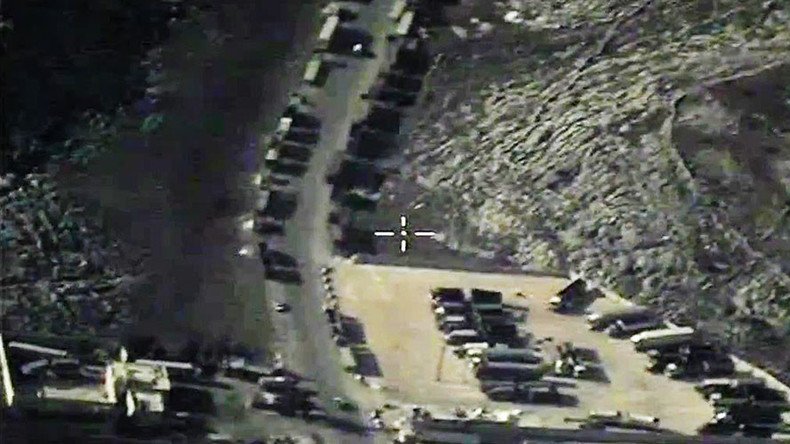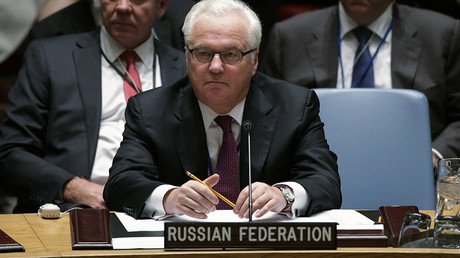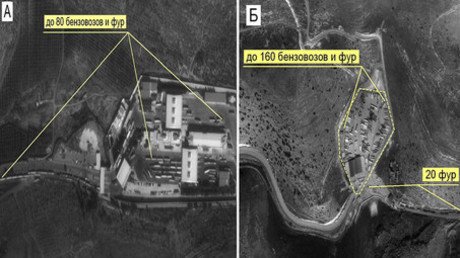Turkey must do more to stop terrorist oil trade, Washington says

Ankara must take strong measures to prevent terrorist groups in Iraq and Syria from benefiting from illegal oil trade, hostages and antiquities, the US Department of State has said in a report.
Turkey's rapid economic growth – combined with the country’s commercial relationships and geographical proximity to unstable conflict-plagued areas like Iraq, Syria and Crimea – makes it "vulnerable to money laundering and terrorist finance risks," the US Department of State said in a report on narcotics, money laundering and financial crimes.
The report stated that in addition to drug trafficking, other key sources of laundered funds range from tax evasion to kidnapping.
"Terrorism financing is present, particularly in the form of cash flows across Turkey’s southern border into Syria; and terrorist organizations with suspected involvement in narcotics trafficking and other illicit activities are present in Turkey. Turkey’s nonprofit sector remains vulnerable to terrorism financing. Recent conflicts at the southern border of Turkey have increased the risks for additional sources of terrorism financing and money laundering attached to human trafficking and oil and antiquities smuggling from the region to Europe."
According to the report, money laundering methods in Turkey include "large scale cross-border smuggling of currency; bank transfers into and out of the country; trade fraud; and the purchase of high-value items such as real estate, gold, and luxury automobiles." Turkish-based traffickers usually transfer money via couriers (the underground banking system), and bank transfers to pay narcotics suppliers in Pakistan or Afghanistan. Funds are often transferred to accounts in the United Arab Emirates, Pakistan, and other Middle Eastern countries.
“Turkey’s investigative powers, interagency cooperation, law enforcement capability, oversight, and outreach are weak and lacking in many of the necessary tools and expertise to effectively counter this threat through a comprehensive approach; these areas need to be strengthened," the US State Department says in the study, adding that Turkey’s nonprofit sector is not audited on a regular basis for terrorism financing activity and does not receive adequate outreach or guidance from the government in the areas of Anti-Money Laundering/Combating the Financing of Terrorism (AML/CFT).
"Turkey has not kept adequate statistics on prosecutions and convictions since 2009. Subsequently, Turkey’s record of official investigations, prosecutions, and convictions is unclear. No data was available for 2014," the report stated, adding that in 2015 Turkey's financial intelligence unit MASAK referred to public prosecutors 387 individuals based on suspicion of money laundering and only 61 individuals based on suspicion of terrorism.
"Turkey has no civil asset forfeiture procedures and its criminal procedures and practices are primitive," it concluded.
In December 2015, the Russian Defense Ministry released evidence which it said unmasked vast illegal oil trade by Islamic State (IS, formerly ISIS/ISIL) and pointed to Turkey as the main destination for the smuggled oil. The ministry presented photos of oil trucks, videos of airstrikes on IS oil storage facilities and maps detailing the movement of smuggled oil, supporting claims that Ankara was aiding the terrorists.
Ankara has denied all allegations, with the US throwing its weight behind Turkey and refuting any talk of ties between Ankara and IS.
READ MORE: Most smuggled ISIS oil goes to Turkey, sold at low prices – Norwegian report
A report on illegal oil sales by Islamic State, ordered to be compiled by Norway, later revealed that most of the IS-smuggled oil was destined for Turkey, where it is sold off at bargain low prices. “Large amounts of oil have been smuggled across the border to Turkey from IS-controlled areas in Syria and Iraq,” Norwegian daily Klassekampen, which leaked details of the report, cited it as saying. “[The] oil is sent by tankers via smuggling routes across the border [and] is sold at greatly reduced prices, from $25 to $45 a barrel.”














